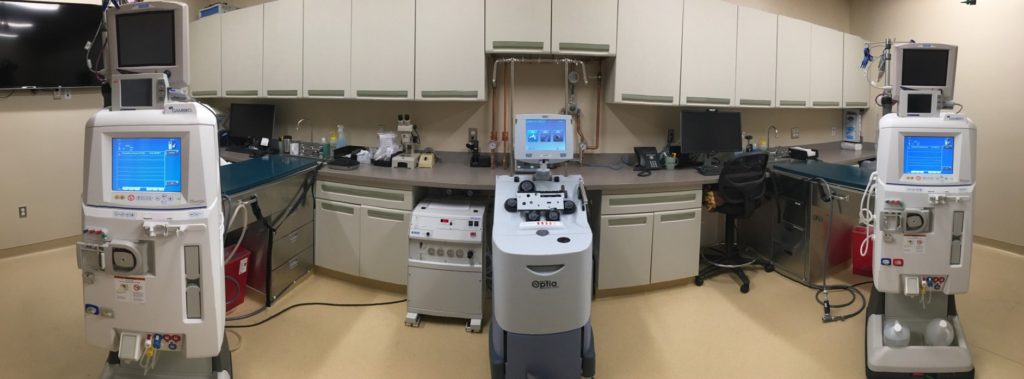Hemodialysis
Friendship Hospital for Animals offers a range of extracorporeal services including hemodialysis, hemoperfusion, and ultrafiltration. The most common indication for hemodialysis in our patients is acute kidney injury.
Hemodialysis is a method of removing toxic and harmful substances from the blood. To do so, blood is passed through a specialized filter (dialyzer or “artificial kidney”) which directly removes those harmful substances. The “clean” blood is now returned back to the patient. A typical treatment may last as little as 4 hours or as many as 8 hours depending on the severity of disease. Hemoperfusion involves passing blood through an additional cartridge that contains activated charcoal, helping to remove large toxins that are too large to pass through the dialyzer.

The duration of dialysis therapy is quite variable. Many toxicities (such as ethylene glycol, NSAID ingestion, etc.) may be treated with a single session, while patients with acute kidney injury may require more prolonged support. Patients with severe kidney injury may require weeks to months to regain kidney function. Dialysis helps to remove the toxins that accumulate during kidney failure to improve your pet’s quality of life. Dialysis helps them to regain an appetite, feel less nauseated, and become more active. Dialysis is initially performed on an inpatient basis; however, patients are transitioned to outpatient dialysis when stable.
What Can Be Treated:
- Antifreeze (Ethylene Glycol) Ingestion
- Congestive Heart Failure
- Leptospirosis (dogs)
- Ureteral Obstruction
- Lily Toxicity
- Hyperkalemia and Acidosis
- Acute Poisonings (some may be treated with hemoperfusion)
- Acute kidney injury of any cause
- NSAID toxicity
- Chronic Renal Failure/Chronic Kidney Disease
- Many Other Accidental Toxins and Medication Exposures
A Note on Toxicities: Poison Control Centers often do not realize dialysis can help in the treatment of a toxicity. Dialysis treatment prior to organ dysfunction gives patients the best possible outcome. Call to discuss if dialysis can help!
For more information on our Dialysis service, please contact us.
